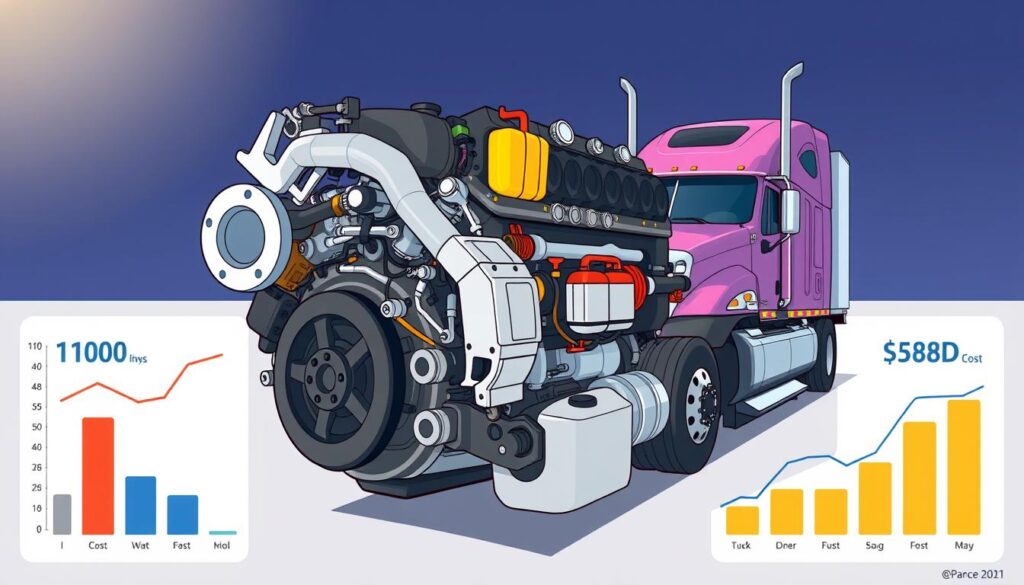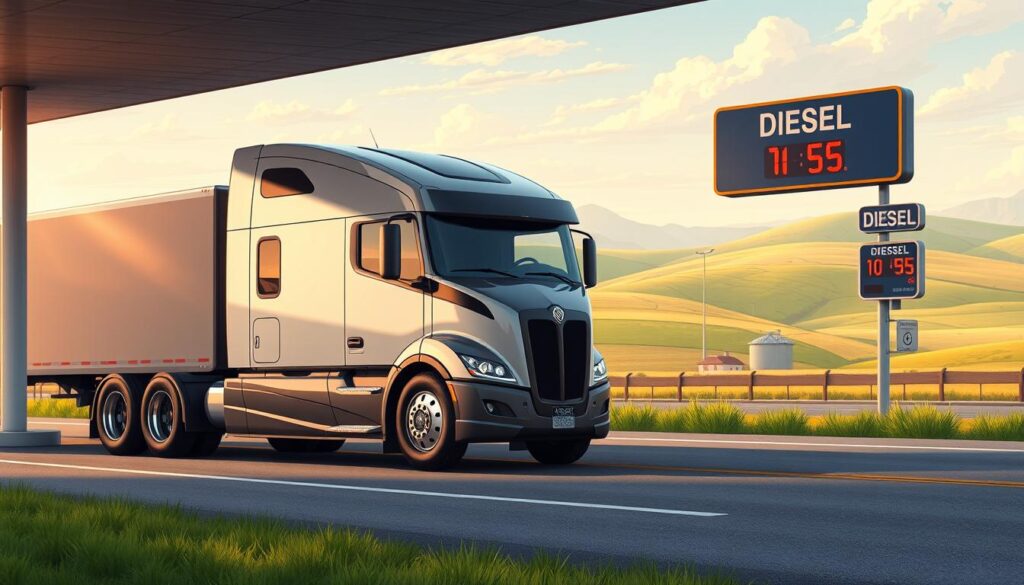I’ve always backed diesel engines for long drives. They’re known for their better fuel efficiency, often up to 30% more than gasoline engines. This makes them a top pick for drivers who cover a lot of miles.
But, things have changed, and the diesel advantage isn’t as big as it used to be. Diesel cars can still get great mileage, sometimes over 50 mpg. Yet, the difference between diesel and gasoline engines is smaller now.
The cost of diesel fuel is another thing to think about. Diesel has always been pricier than other types of gasoline. This can lessen the savings diesel engines offer, especially for drivers who don’t drive a lot.
Contents
Key Takeaways
- Diesel engines still offer superior fuel efficiency, but the gap with gasoline engines has narrowed.
- The higher cost of diesel fuel can eat into the fuel savings, especially for drivers who don’t rack up high mileage.
- Maintenance costs for diesel vehicles are generally higher, which can further impact the overall cost of ownership.
- Diesel engines are known for their longevity and reliability, making them a good choice for long-distance driving.
- The decision to choose a diesel or gasoline engine should consider the total cost of ownership, not just fuel savings.
Understanding Diesel Engine Fundamentals
Diesel engines are key for long trips and heavy work. They work differently from gasoline engines. They use the heat and pressure from the combustion cycle for better fuel use.
How Diesel Engines Work
Diesel engines use a special way to ignite fuel called compression ignition. They don’t need spark plugs. Instead, they squeeze the air so much it gets very hot. Then, the diesel fuel ignites by itself, starting the cycle.
These engines can mix air and fuel in a 25:1 to 40:1 ratio. Gasoline engines mix it 12:1 to 15:1. This lean mix, along with high compression and strong build, makes diesel engines very efficient.
Diesel vs. Gasoline Engine Differences
Diesel and gasoline engines are very different. Diesel engines have a lot of torque, which is great for towing. They also have a higher compression ratio and ignite fuel differently, making them more fuel-efficient.
Diesel engines are made to last with strong parts like cast-iron blocks and forged-steel crankshafts. These parts help them handle the high pressures and temperatures of the combustion cycle.
| Key Differences | Diesel Engines | Gasoline Engines |
|---|---|---|
| Ignition Method | Compression Ignition | Spark Ignition |
| Air-Fuel Ratio | 25:1 to 40:1 | 12:1 to 15:1 |
| Torque-to-Horsepower Ratio | 2:1 or higher | Lower than diesel |
| Boost Levels | 25 to 35 psi | 10 psi considered excessive |
| Engine Construction | Heavy-duty components | Less robust components |
“Diesel engines are built with heavy-duty components such as deep-skirt cast-iron or graphite iron blocks, forged-steel crankshafts and connecting rods, and cylinder heads with at least 6 head bolts per cylinder.”
Evaluating Fuel Efficiency and Costs
Miles Per Gallon Comparison
Diesel engines used to beat gasoline engines in miles per gallon, especially in light-duty vehicles. But now, the difference is smaller. The mpg advantage for diesel trucks is less than 2 mpg. This might not be enough to make up for the higher cost of diesel fuel.
In government and fleet use, where vehicles idle a lot and cover short distances, diesel’s fuel efficiency edge is less clear. A study by the University of Michigan found diesel vehicles could save money in the first five years. But, diesel costs about $1,203 more over five years than gasoline vehicles, assuming 15,000 miles a year.
Driving habits, tire pressure, and maintenance affect fuel efficiency, not just the engine type. By improving these areas, fleets can make their vehicles more efficient. This could help balance out the cost of diesel fuel.
| Fuel Efficiency Improvement Strategies | Estimated Fuel Economy Gains |
|---|---|
| Proper tire inflation | 0.6% on average, up to 3% |
| Using manufacturer-recommended motor oil | 1% to 2% |
| Instantaneous or in-vehicle feedback | Average of 6.6% |
| Eco-driving training | 5% to 10% increase |
Using these strategies together can help fleets improve diesel fuel efficiency. This could make diesel fuel costs more manageable, leading to a more affordable long-term operation.
Analyzing Maintenance Expenses
Many think diesel engines are cheaper to keep up, but the truth is different. Diesel vehicles have higher maintenance costs, pricier parts, and more downtime than gasoline cars. This is due to complex SCR emission systems, the need for turbocharger upkeep, and the scarcity of skilled diesel mechanics.
Diesel engines handle high pressures and temperatures, causing parts to wear out faster. They also have special systems like diesel particulate filters and AdBlue injection. These systems need regular checks and replacements, adding to maintenance costs.
| Maintenance Aspect | Diesel | Gasoline |
|---|---|---|
| Routine Maintenance Costs | Higher | Lower |
| Replacement Part Costs | More Expensive | Less Expensive |
| Downtime | Increased | Decreased |
| Emissions Systems Maintenance | More Complex | Less Complex |
| Technician Availability | Limited | Abundant |
Even though diesel engines use less fuel and emit fewer pollutants, their upkeep costs can be higher. This might not be worth it for drivers who don’t drive a lot. It’s important to think about your driving habits and needs when choosing between diesel or gasoline.

Is diesel still more economical for long-distance driving?
The debate between diesel and gasoline engines for long-distance driving is ongoing. Diesel engines used to be seen as the better choice for saving money. But now, the situation has changed, and we need to look at the total cost of owning a car.
Diesel engines are still more fuel-efficient, according to the Department of Energy. They can go up to 35% further on a gallon than gasoline engines. This is great for long trips where saving on fuel is important. But, diesel cars and trucks cost more to buy and maintain.
A study by the University of Michigan found that diesel cars and trucks lose their value less quickly than gasoline cars. This is good news for those planning to keep their cars for a long time. Diesel engines also last longer and hold their value better, with some cars reaching almost 3 million miles.
However, the choice between diesel and gasoline isn’t as simple as it used to be. Modern diesel cars produce less CO2 than gasoline cars, but their effect on the environment is small. A diesel car with 35 miles per gallon uses as much oil and causes as much pollution as a gasoline car with 29 miles per gallon.
Choosing between a diesel or gasoline car for long trips depends on many things. This includes how you drive, your budget, and what you care about the environment. Diesel cars are still good at saving fuel and lasting longer, but you need to think about all the costs to see which is cheaper.
“Diesel vehicles use about 20% less fuel than their gasoline-powered equivalent in both city and highway driving.”
Hybrid cars are now a strong competitor, especially in cities. They save a lot on fuel, which can mean saving $3,000 to $4,000 over five years and 15,000 miles. Diesel cars save less, about $800 to $1,800 in the same time.
As cars change, it’s important for buyers to look at all the costs. This includes how much to pay upfront, how much fuel you’ll use, maintenance costs, and what you can sell the car for later. This helps figure out the best choice for long trips.
Factors Influencing Diesel Vehicle Ownership
Owning a diesel-powered vehicle is more than just looking at fuel efficiency and costs. Fleet managers need to think about the initial cost and resale value of diesel vehicles. These factors are key to deciding on long-term ownership.
Acquisition Costs and Resale Values
Diesel vehicles usually cost more than gasoline ones at first. This is because diesel engines have more torque and last longer. But, the higher cost might be worth it because diesel is more fuel-efficient and lasts longer. Plus, diesel vehicles often keep their value better than gasoline ones, which can be good when selling or trading them in.
Torque and Horsepower Considerations
Diesel engines are known for their strong torque, which is great for towing or hauling heavy loads. This, along with their efficiency, makes them a good choice for fleet managers who want power and capability. But, in government and fleet settings, the need for maximum power might be less important.
Fleet managers should think about diesel vehicle pricing, resale value, and engine performance when choosing a powertrain. Looking at the total cost over time helps them make smart choices. They can balance the cost of buying with the savings over time.
| Metric | Gasoline Vehicle | Diesel Vehicle |
|---|---|---|
| Average MSRP | $25,000 | $27,500 |
| Average Resale Value (3 years) | $15,000 | $17,500 |
| Fuel Efficiency (MPG) | 25 | 30 |
| Torque (lb-ft) | 150 | 250 |

Assessing Engine Longevity and Vehicle Lifespan
Diesel engines are known for their long life, but this might not matter much for government and commercial fleets. These groups often replace their vehicles before they reach the end of their useful life. This is due to maintenance schedules, new technology, or changes in how they use the vehicles.
My research shows that both gasoline and diesel vehicles in these fleets are replaced around the same time. So, the idea that diesel engines last longer isn’t as big of a deal. Fleet managers should look at which powertrains are best for their needs. They should consider costs like buying, fuel use, upkeep, and selling the vehicles.
The choice between diesel and gasoline engines depends on the fleet’s needs and the work they do. By looking at these factors, fleet managers can pick the best options for their vehicles. This way, they can make sure their vehicles work well and are cost-effective, no matter the engine type.
Source Links
- https://www.progressive.com/answers/gas-vs-diesel-cars/ – Diesel vs. Gas Engines
- https://www.mycarly.com/blog/car-maintenance/diesel-short-haul-why-its-important-to-drive-longer-distances-regularly/ – Are short trips bad for diesel engines? The importance of driving long distances regularly
- https://www.dat.com/resources/diesel-trucks-vs-gasoline-trucks – Diesel Trucks vs. Gasoline Trucks — Which Is Right For You? – DAT
- https://powerservice.com/learning/a-beginners-guide-to-understanding-diesel-engines/ – A Beginner’s Guide To Understanding a Diesel Engine
- https://blogs.mtu.edu/globalcampus/tag/short-courses/ – short courses Archives | Michigan Tech Global Campus News
- https://www.government-fleet.com/156355/gas-vs-diesel-the-bad-investment-only-fleet-managers-know-about – Gas vs. Diesel: The Bad Investment Only Fleet Managers Know About
- https://afdc.energy.gov/conserve/driving-behavior – Efficient Driving to Conserve Fuel
- https://truckingresearch.org/sustainable-driving-practices/ – Part 1 – The Role of Truck Drivers in Sustainability
- https://www.carwow.co.uk/guides/choosing/petrol-diesel-878 – Petrol Vs Diesel Cars: Which is the Better Choice?
- https://thompsontractor.com/blog/diesel-engine-maintenance/ – Diesel Engine Maintenance – Thompson Tractor
- https://www.envasetechnologies.com/comparing-total-cost-of-ownership-electric-vs-diesel-trucks/ – Comparing the Total Cost of Ownership of Electric Vs. Diesel Trucks – Envase Technologies
- https://www.progressive.com/answers/pros-and-cons-of-diesel-cars/ – Pros and Cons of Diesel Cars
- https://blog.ucsusa.org/dave-cooke/diesel-vs-hybrid-cost-benefits-410/ – Diesel vs Hybrids: The Costs and Benefits of Both (And a Shiny Calculator!)
- https://inseego.com/au/resources/blog/petrol-vs-diesel-which-fuel-type-is-better-for-your-fleet/ – Petrol vs Diesel: which fuel type is better for your fleet?
- https://deepblue.lib.umich.edu/bitstream/handle/2027.42/111893/103193.pdf – PDF
- https://www.eia.gov/energyexplained/diesel-fuel/factors-affecting-diesel-prices.php – Factors affecting diesel prices – U.S. Energy Information Administration (EIA)
- https://www.keepyourdaydream.com/diesel/ – Are Diesel Trucks Worth the Extra Cost?: Gas vs. Diesel for Towing an RV – Keep Your Daydream
- https://www.pfleet.com/blog/what-is-the-difference-between-diesel-and-gasoline – What Is the Difference Between Diesel and Gasoline?
- https://www.greencarreports.com/news/1113564_those-fuel-efficient-diesels-actually-worse-on-lifetime-co2-study-says – Those fuel-efficient diesels? Actually worse on lifetime CO2, study says

Hi, I’m Sufiyan, the developer behind this platform. I created FuelConsumptionCalculator.com to simplify fuel tracking for everyone — because understanding your vehicle shouldn’t require a degree in mechanics. I’m always working on adding more tools and content to make this site even more useful

